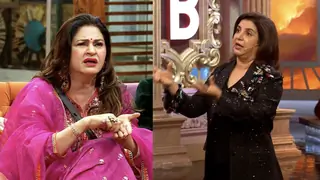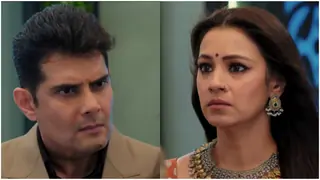No kidding! | ||
| Many urban Indian women are choosing to opt out of motherhood. Shuma Raha finds out why | ||
At 34, actress Jaya Battacharya is at the peak of her career. Best known for her roles in television serials like Kyunki Saas Bhi Kabhi Bahu Thi, Virasat and Heena, Bhattacharya, who has been in a live-in relationship for the last 11 years, has decided not to have a child. Ever. "I lead a hectic life, with too much to do and too little time," she says. "I feel I simply would not be able to give my child the kind of time that I would like to. And I don't want to be pressured into having a kid just because it's the done thing." An unusual choice? Perhaps. But it's a choice that a number of urban Indian women — all of them busy professionals — are exercising today. They are opting out of motherhood not because they don't like children but because they don't quite see themselves in the role of the do-it-all ber woman who manages kids and career with splendid ease. They may hear the biological clock ticking, but it is not a sound that sends them into a tizzy about having to fulfil their so-called given role in society. To them, not having a baby is a lifestyle choice, a choice that challenges, and indeed, overturns the tired old notion that motherhood is a necessary addendum to being a woman. "I do not think motherhood is instinctive to women, nor that just because one is a woman one will automatically enjoy being a mother," says Samita Sen, 43, reader, department of history, Calcutta University. Sen married late — at 37. "But I had decided fairly early on that I would not have a child. I had seen too many women with children getting distracted and not being able to fulfil their potential," says Sen, who is so consumed with her work that rearing a child never looked like an attractive option. "My work was something that I had. I didn't want to risk it for something that I might not like," she says with a chuckle. Sen's words have a whiff of the radical in a society that never ceases to wax eloquent on the "joys" of motherhood. While that joy may be all too true for some, the point is that for some others, choosing to remain childfree has its own set of rewards. "It's not a negative choice at all," says Nilanjana S. Roy, a 30-something Delhi-based freelance writer (and a columnist on this page) who is another member of the voluntarily childless brigade. "On the contrary, it sets you free from the many dilemmas — professional and personal — that motherhood brings." Lynette Scavo, the perennially frazzled suburban mom in Desperate Housewives, who traded a high-flying career for children — four perfect little hellions, actually — may be the stuff of over-the-top TV drama. But in a sense, she epitomises the image of self-sacrificing motherhood that many women are turning their backs on. Of course, women preferring to be childfree are still a tiny minority in our country, and that too confined almost entirely to the urban upper middle class. Their numbers are a far cry from those in the West, especially Europe, where falling birth rates have evoked fears that by 2050 an ageing population wouldn't have enough young workers to support it. As Anjan Ghosh, sociologist at the Centre for Studies in Social Sciences, Calcutta, points out, "In India, it is only a small number of economically independent, professionally qualified women who are delaying reproduction and in some cases, eschewing it." Even so, the fact that their numbers are on the rise is a measure of a growing awareness that their function in society is not necessarily a biological one. S. Nandajanani, 30, product manager at Standard Chartered Bank, Mumbai, is one such new age woman who can take motherhood or leave it. "Neither my husband nor I think that having a child is a given in our marriage." Nandajanani may yet decide to have a baby. "But I really feel no burning need to have one. Nor do I think that I shall be 'fulfilled' as a woman if I become a mother," she says. For most of these women, the decision not to have babies really stems from a combination of two factors — the absence of any overwhelming desire to have a child, coupled with the realisation that they may not be comfortable making compromises in their work-life situation — something that a child would automatically entail. And for many of them, it isn't that having a child was never on the agenda, but rather that it was never a top priority. As Bala Deshpande, a senior executive at a financial services company in Mumbai, who is now in her late 30s, puts it matter of factly, "When we got married in the 1990s, my husband and I decided to put off babies because our careers took up all our time. And over the years we realised that we were happier this way." "The problem," says Professor Bula Bhadra, head of the department of socio-logy, Calcutta University, "is that women in professional jobs do not have any social support when it comes to parenting. The social systems, including the workplace, are still patriarchally constituted." This, together with the fact that they feel they can fulfil their human potential without becoming mothers, leads many to opt out of motherhood altogether, says Professor Bhadra. Still, the decision to remain childfree is not arrived at in a day. It is usually agonised over, discussed threadbare and, of course, requires the support of the husband or the partner. Roy, for instances, confesses to having discussed the issue with her husband again and again. "But in the end, we both realised that parenting was not something we were passionately keen on," she says. But once the decision has been taken, what of the social pressure, or censure, that one faces for having bucked the norm and chosen not to have children? Most say that while their immediate families and friends appreciate their decision, the wider social circle continues to view it with suspicion and curiosity. As Roy points out, "It's still thought to be an 'unnatural' choice. People think that you're selfish, that you're shirking your responsibility, or that there's something wrong with you." Does that bother them? "Not at all," says Jaya Bhattacharya, "It's a choice that works for me. Why should I care what other people think about it?" However, while these women are unapologetic about their decision not to go in for motherhood, most say that they get all the baby fix they need from their nephews and nieces. "I enjoy the company of children," says Sen. "It's just that I feel that they don't have to be mine." Clearly, it's an idea whose time has come. |
























